Ever wondered how the Japanese tea ceremony intertwines with the principles of Zen philosophy?
The practice goes beyond just making and drinking tea; it’s a gateway to a state of calm and mindfulness.
But how exactly does this centuries-old tradition lead to a deeper understanding of oneself and the world around us?
Stay tuned to uncover the secrets behind this harmonious blend of culture and spiritual reflection, and how you can embark on your own journey of zen through the art of the Japanese tea ceremony.
Just The Basics
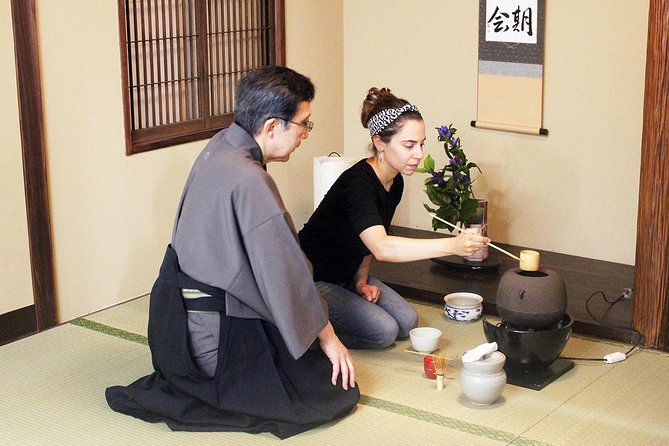
- Embrace mindfulness and tranquility through tea ceremony practice
- Learn traditional tea etiquette for a Zen-inspired experience
- Cultivate inner calm with guided meditation and culture
- Experience personalized instruction for a meaningful journey into Zen
Here's some other great tours and experiences nearby we think you'll like.
Tea Ceremony Essentials
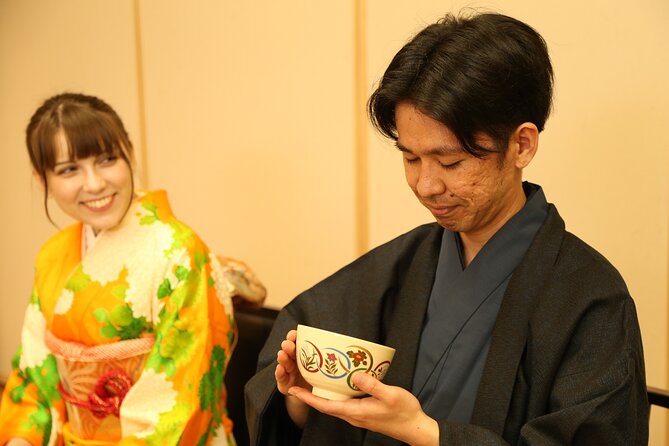
What’re the essential items needed for a memorable Japanese tea ceremony experience with a bilingual licensed tea master in Tokyo?
For a true culture, understanding tea etiquette is key. Participants can expect to learn the proper way to prepare and enjoy matcha green tea, as well as savor traditional Japanese sweet confections.
The tea master, with over 5 years of experience, will guide guests through a tea ceremony performance, followed by a hands-on session where participants can try their hand at the art of tea-making. This practical experience not only offers a glimpse into Japanese traditions but also allows for a deeper appreciation of the intricacies of tea culture.
Zen Experience in Tokyo
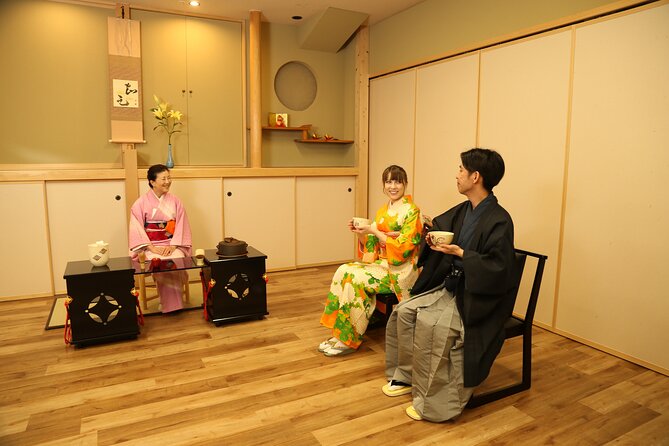
For a serene and budget-friendly Zen experience in Tokyo, visitors can enjoy traditional practices that promote mindfulness and relaxation. Tokyo offers a variety of options to experience Zen, from tranquil Zen gardens to guided meditation techniques.
Strolling through the city’s Zen gardens can provide a peaceful escape from the hustle and bustle, allowing visitors to connect with nature and find inner calm. Many temples in Tokyo also offer meditation sessions, where participants can learn different techniques to quiet the mind and focus on the present moment.
These experiences aren’t only culturally enriching but also perfect for those seeking a moment of tranquility amidst the vibrant city life of Tokyo.
Logistics and Meeting Point
Visitors can easily find the meeting point for the Japanese Tea Ceremony Practice at Kikai Shinkō Kaikan in Tokyo, ensuring a convenient start to the experience. Once there, they’ll receive instructions at the building’s main entrance, setting the tone for a seamless beginning. This central location allows for easy access and sets the stage for a smooth transition from the outside world to the realm of culture and tea etiquette.
- Meeting point at Kikai Shinkō Kaikan
- Instructions provided at the main entrance
- Convenient end point back at the meeting spot
This straightforward setup ensures that participants can focus on the upcoming experience without worrying about logistical details.
Participant Expectations
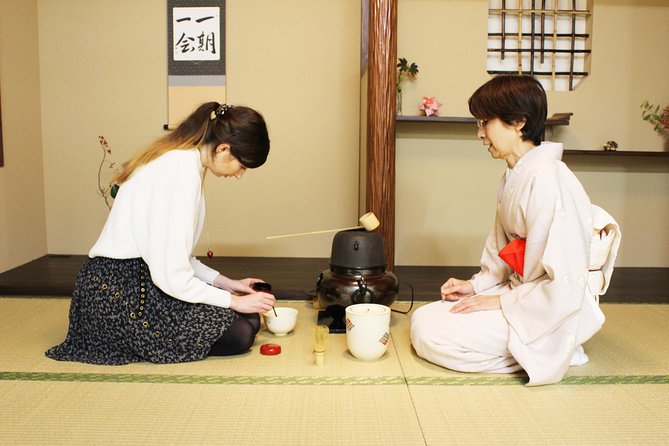
Participants should expect clear communication and detailed guidance throughout the Japanese Tea Ceremony Practice experience. The focus is on culture and mindfulness practice, so they should come prepared to engage fully. Understanding tea ceremony etiquette and traditional rituals will enhance their experience.
The bilingual licensed tea master and the tea ceremony performance will provide insight into the intricate world of Japanese tea culture. Participants will also have the opportunity to partake in a second tea ceremony under expert instruction, allowing them to practice what they’ve learned. With a maximum of 28 travelers, the setting promises an intimate and personalized experience.
Additional Booking Information
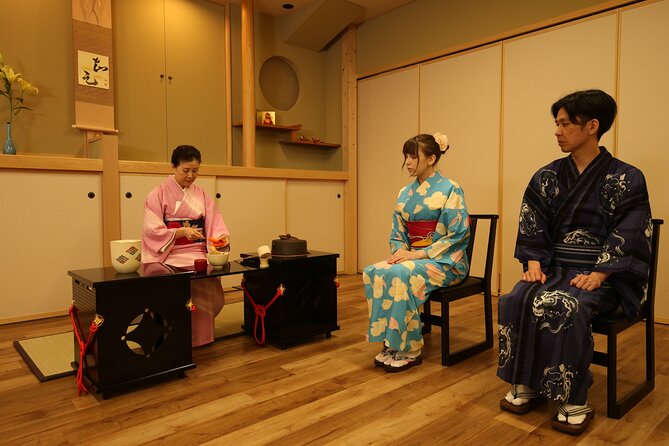
When considering making a reservation for the Japanese Tea Ceremony Practice, keep in mind the importance of checking the available dates and times for this unique cultural experience. Here are some booking tips to help you secure your spot and maximize your culture:
- Be sure to book in advance as spots fill up quickly.
- Consider weekdays for potentially less crowded sessions.
- Check for any special promotions or discounts available for booking online.
Enjoy the tranquility of the tea ceremony and embrace the Zen spirit as you participate in this traditional Japanese ritual. By following these booking tips, you can ensure a smooth reservation process and fully enjoy this enriching experience.
Cancellation Policy
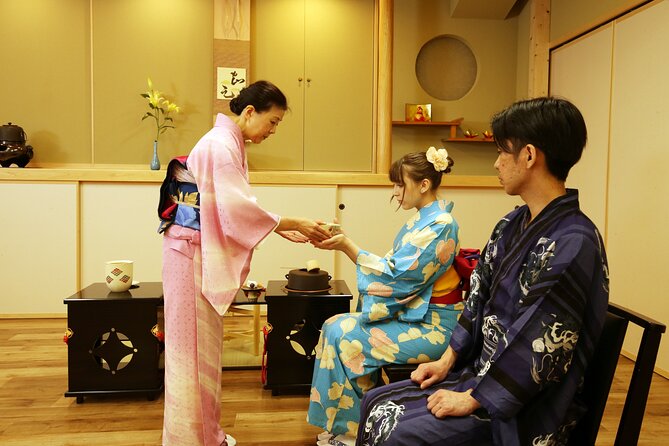
To ensure a hassle-free experience, make sure to cancel your reservation for the Japanese Tea Ceremony Practice at least 24 hours prior to the scheduled start time for a full refund. In case of last-minute changes, refunds won’t be possible if canceled less than 24 hours before the start time. It’s essential to keep this in mind to avoid any disappointment.
Travel insurance might be worth considering for unexpected situations that could arise, ensuring you’re covered in case of emergency. Remember, the refund process strictly adheres to the policy, so plan accordingly. It’s always wise to double-check your schedule and make any adjustments well in advance to make the most out of your Japanese Tea Ceremony experience.
Frequently Asked Questions
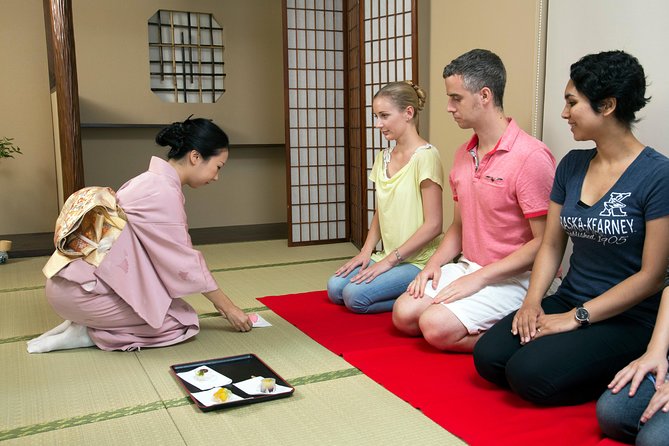
Can Children Participate in the Tea Ceremony Experience, or Is It Strictly for Adults?
Children can definitely participate in the tea ceremony experience, as it offers a wonderful cultural experience for all ages. The event is open to families, providing a unique opportunity for children to engage in traditional practices.
Are There Any Specific Dress Code Requirements for Participants in the Tea Ceremony?
Participants should wear traditional attire to honor the cultural significance of the tea ceremony. Comfortable clothing is ideal for this experience. It’s a budget-friendly way to fully immerse in this tradition and show respect.
Is Photography Allowed During the Tea Ceremony, or Are There Restrictions on Taking Pictures?
Photography is allowed during the tea ceremony, but participants are asked to do so with cultural sensitivity in mind. Smartphone use is permitted, but privacy concerns and cultural preservation are paramount. Be respectful and discreet with photos.
Are There Any Dietary Restrictions or Considerations That the Organizers Should Be Aware of Beforehand?
For dietary preferences or health restrictions, organizers should be informed in advance. Cultural considerations and special requests can usually be accommodated. Communication with the organizers is key to ensuring a smooth experience.
Is There a Specific Etiquette or Behavior Expected From Participants During the Tea Ceremony, Beyond What Is Traditionally Practiced?
Participants are expected to follow traditional etiquette during the tea ceremony. Cultural expectations emphasize respect, mindfulness, and tranquility. While modern interpretations may vary, maintaining decorum, attentive listening, and gratitude to the tea master are valued behaviors.
Final Words
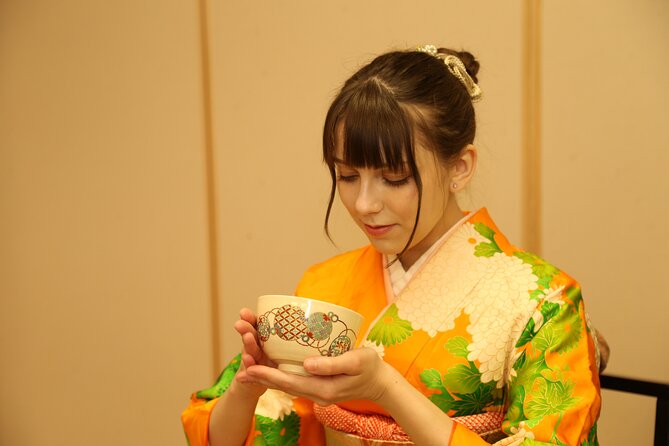
To sum it up, the Japanese tea ceremony at Kikai Shinkō Kaikan in Tokyo offers a budget-friendly and practical way to experience zen and mindfulness.
With a bilingual tea master guiding you through the rituals, you’ll find a moment of peace and reflection in the heart of Japanese culture.
Book your session now to learn about this transformative experience that blends tradition, mindfulness, and the art of tea.
Don’t miss out on this unique opportunity to practice zen in Tokyo!
